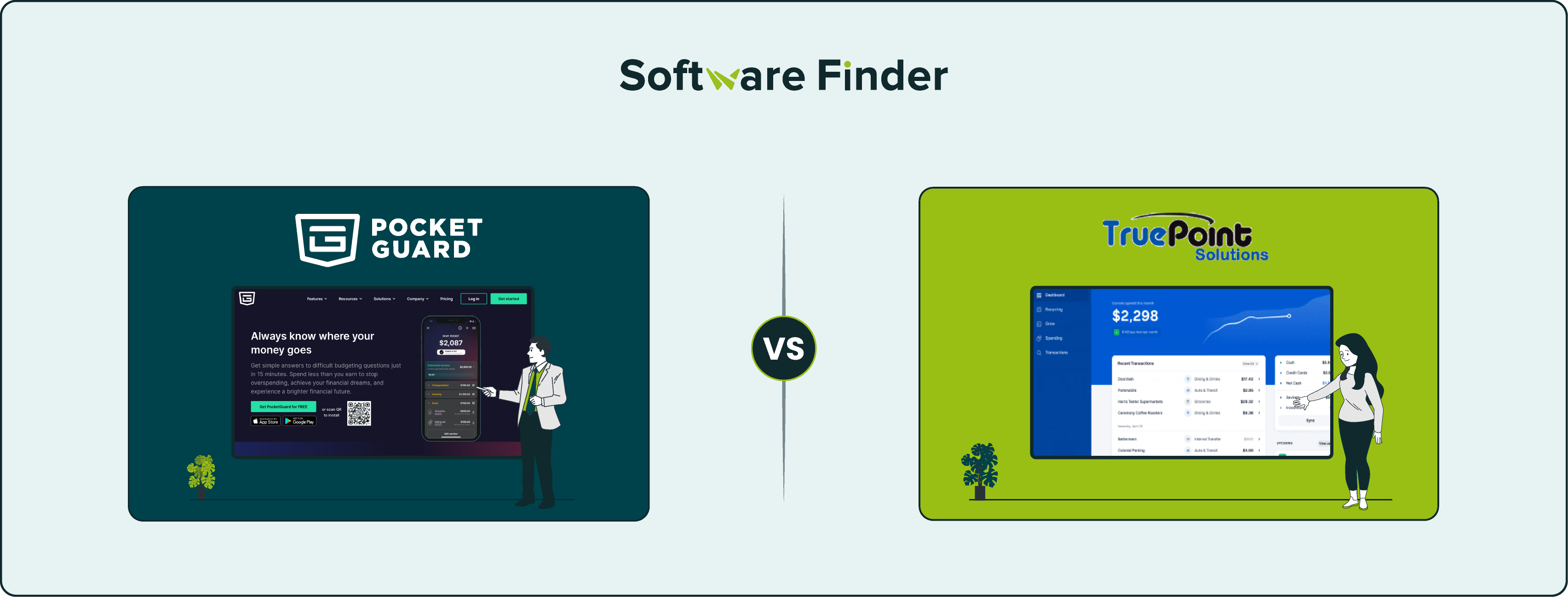
Managing money is easier than ever if you have the right tools. In today’s crowded market of budgeting software, PocketGuard, and Rocket Money (formerly TrueBill) stand out for their smart features and user-friendly design.
Both platforms help you track spending, lower bills, and plan your financial future. However, they take different paths to achieve this. Whether you’re trying to stop overspending or optimize subscriptions, choosing the right app can make all the difference.
In this blog, we’ll break down how PocketGuard and Rocket Money compare based on their features, pricing, usability, and more. This will help you pick the software that best fits your needs.

Feature | PocketGuard | TrueBill |
Net Worth | Comprehensive daily net worth | High-level wealth snapshot |
Spending Insights | Customizable visual spending insights | Real-time spending alerts |
Financial Goals | Flexible, hands-on savings goals | Automated, set-and-forget savings |
Manage Subscription | Manual subscription tracking tools | Automated subscription cancellation service |
PocketGuard is a cloud-based personal money management software designed to help users manage their expenses by tracking spending, creating budgets, and providing insights into financial habits. The software offers features like bill tracking, subscription management, and savings goals, with a focus on preventing overspending. It provides users with a clear picture of their finances, enabling them to make more informed day-to-day spending decisions.
Standout Features

- Debt Payoff Plan: This feature helps users achieve debt freedom with a personalized plan tailored to their unique financial situation. By entering account details, annual percentage rates, and monthly budgets, users can select a strategy, prioritize payments, and generate a real-time payoff schedule to stay on track and reach their goals faster.
- Cash Flow: The software tracks income and expenses, helping users see how much money remains each month. It breaks spending into recurring and variable categories, reveals net income, and encourages smarter adjustments to stay on budget and save more.
- Transactions: PocketGuard gives users complete control over their transaction history. Users can attach receipt images, add searchable notes and hashtags, and organize purchases by splitting them into categories. It also allows editing of pending items, hiding of irrelevant transactions, and viewing merchant history to better understand long-term spending patterns.
Pros And Cons
Pros:
- Avoid manually entering your transactions
- Offers savings goals and debt repayment tools
- Tells you how much you have left to spend each month
Cons:
- No credit score or investment tracking tools
- The free tier offers very limited features
TrueBill (now known as Rocket Money) is a cloud-based personal finance software that helps users save more, spend less, and gain clarity on their finances. It automatically tracks subscriptions, negotiates bills, and categorizes spending. With features like automated savings, balance alerts, and net worth tracking, it gives users a proactive roadmap to control their money and reduce financial stress.
Standout Features

- Credit Score: This feature provides users with full access to a detailed credit report and breakdown, including key factors like payment history and credit utilization. TrueBill tracks credit score changes in real time, sends alerts for important updates, and offers personalized insights to help users understand and improve their credit health.
- Bill Negotiation: The software automatically scans and negotiates users’ bills to help save money on services such as cell phone, cable, and internet. TrueBill’s concierge team also helps secure refunds for overdrafts and late fees, and simplifies the process of finding better car insurance rates with minimal effort.
- Budgeting: TrueBill allows users to create customized budgets that automatically monitor spending by category. It analyzes transaction history to determine monthly spending limits, offers goal trackers to improve spending habits, and sends timely alerts to keep users on track with their financial goals.
Pros And Cons
Pros:
You can connect all your bank accounts, credit cards, and investment accounts to get a comprehensive overview of your finances. The platform also offers net worth and credit score monitoring, along with alerts for upcoming charges and spending.
Cons:
The free plan comes with limited features, and customer support availability is also restricted.

PocketGuard charges $12.99/month for its premium plan, which users can try free for 7 days. This plan unlocks advanced budgeting tools, unlimited account connections, and personalized financial insights.
TrueBill offers a free app with optional premium features to enhance financial management. Their Premium Membership is flexible, with prices typically ranging from $6 to $12/month. New premium users also get a 7-day free trial before being charged.
Disclaimer: The pricing is subject to change.
Both PocketGuard and TrueBill offer valuable tools to help you take control of your finances. PocketGuard shines with its detailed tracking, customizable goals, and in-depth spending insights, ideal for users who want hands-on management.
TrueBill appeals to those who prefer automation and convenience, especially with its concierge subscription cancellation and effortless savings features.
Ultimately, your choice depends on whether you want granular control or a simplified, set-it-and-forget-it experience for managing your money.
